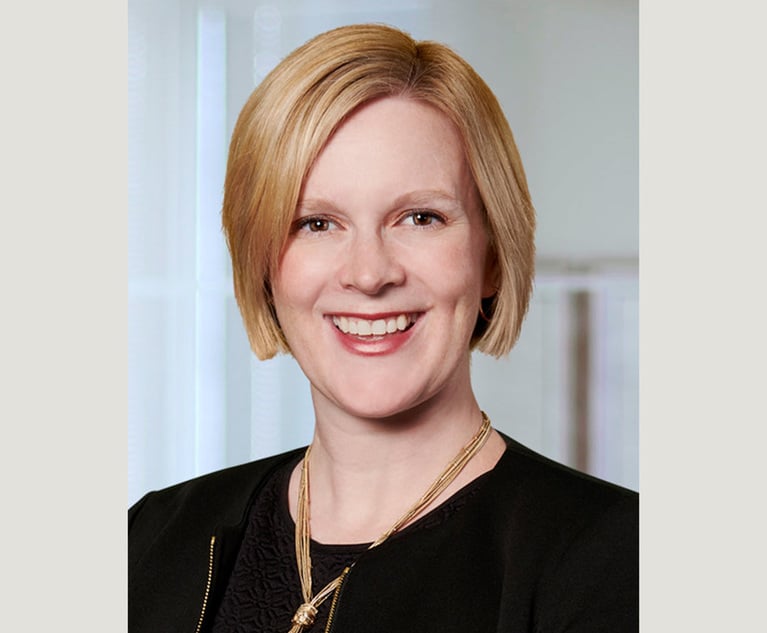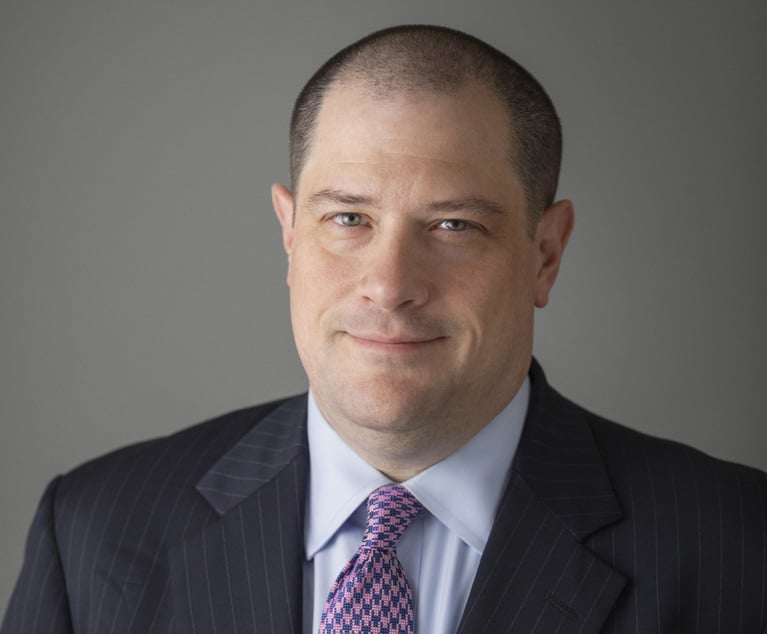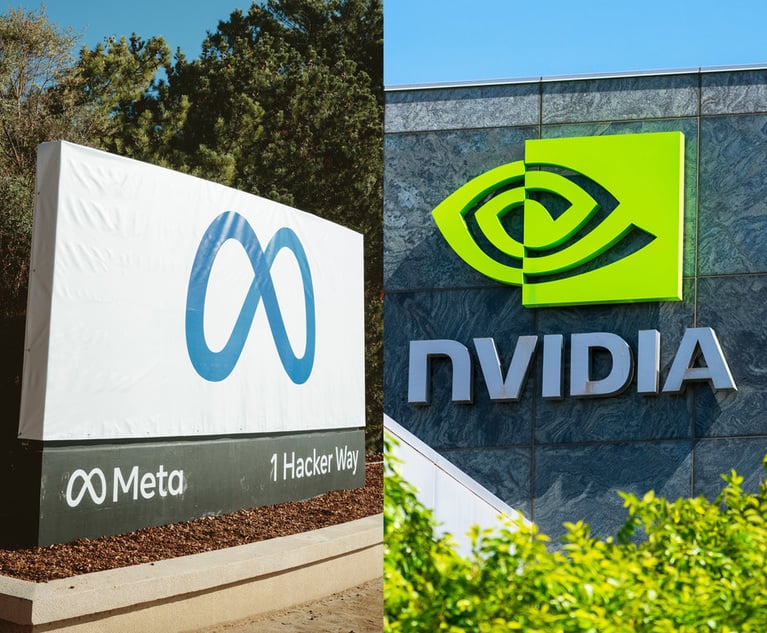 Walmart store. Photo: Diego Radzinschi.
Walmart store. Photo: Diego Radzinschi.How Robbins Geller Beat the Feds in Walmart Settlement
For those who might question the value of a private right of action in securities litigation, this case is a good example of its efficacy.
June 25, 2019 at 11:43 AM
5 minute read
Looking for the real winner in last week's $282 million settlement between Walmart, the Justice Department and U.S. Securities and Exchange Commission that resolved charges of overseas bribery?
Robbins Geller Rudman & Dowd.
Because while government officials in press releases were busy patting themselves on the back (“The Department of Justice will continue to aggressively investigate and prosecute foreign corruption” and “Through our efforts, we delved through layers of transactions and uncovered the bribery of foreign officials” and “The FBI will hold corporations responsible when they turn a blind eye to corruption”), they neglected to mention one thing: Robbins Geller lawyers extracted a bigger settlement from Walmart than either the DOJ or SEC for the same underlying misconduct, and they did it more quickly.
For those who might question the value of a private right of action in securities litigation, this case is a good example of its efficacy.
In December, Robbins Geller litigators led by Jason Forge hammered out a $160 million deal with Walmart, which was represented by Latham & Watkins lawyers including Peter Wald, for covering up suspected overseas corruption in Mexico.
Six months later, the SEC on June 20 announced that Walmart would pay $144 million to settle charges of violating the Foreign Corrupt Practices Act, while the DOJ settled FCPA criminal charges for $138 million. The federal cases also covered alleged wrongdoing in India, Brazil and China. It's like backwards day. Usually the class action rides on the coattails of the federal case, and the DOJ or SEC often gets the biggest payout.
So what happened here?
For one thing, it wasn't some years-long federal investigation that cracked the case. It was New York Times reporter David Barstow, who in April of 2012 broke the story that Walmart's largest foreign subsidiary, Wal-Mart de Mexico “had orchestrated a campaign of bribery to win market dominance,” and that when company leaders were informed, they hushed it up.
 Once Walmart knew the story was coming, it allegedly disclosed in an SEC filing a few months prior to publication that it had launched an internal investigation into its FCPA compliance.
Once Walmart knew the story was coming, it allegedly disclosed in an SEC filing a few months prior to publication that it had launched an internal investigation into its FCPA compliance.
For once, this meant that private lawyers and the government started their cases on relatively equal footing.
Still, the feds have far more investigative tools at their disposal. Robbins Geller actually filed a Freedom of Information Act suit against the SEC in a bid to force the agency to share thousands of documents Walmart had turned over to the government. The SEC refused, successfully arguing that the documents were part of an ongoing investigation. This meant Robbins Geller had to build its case with less information than the feds.
The government also has far more leverage to exact settlement concessions. “The SEC can ban people from serving on corporate boards, the DOJ can put people in jail,” Forge noted. “The government has a way bigger stick.”
All he could do was threaten Walmart's bottom line.
To Forge, it's “absolutely shameful” that he and his co-counsel reached the settlement finish line before the feds. “I'm disgusted at the pace the government worked,” he said.
Moreover, he said he knows of no other cases where the SEC and DOJ each brought separate charges, but neither recovered as much as a parallel private securities suit.
“I think the reason the government took so long and came up short was largely because of politics,” Forge said, noting that the case spanned both the Obama and Trump administrations.
By contrast, he said, “There was no incentive for us to do anything but maximize the recovery.”
They did.
The class action settlement terms are generous—shareholders who purchased or otherwise acquired Walmart common stock between December 8, 2011, and April 20, 2012, stand to receive at least 50% of their damages. By comparison, the average shareholder recovery in comparably-sized 10b-5 class actions is 3% of damages, according to Robbins Geller.
It was Walmart's first-ever securities class action settlement, as well as the largest confirmed settlement ever obtained in a single case against Walmart—a record that still stands after the SEC and DOJ cut their deals.
As Forge put it in a court papers, “As the largest retailer in the world with hundreds of billions of dollars in annual revenues, Walmart has a proven track record of aggressively, and successfully, defending itself. It does not simply throw money at plaintiffs to make them go away.”
The firm was awarded attorneys' fees of 30% of the $160 million settlement (a cool $48 million), plus expenses in the amount of $616,964.66. Barrett Johnston LLC served as additional counsel and Patton Tidwell & Schroeder was liaison counsel.
“The court finds that the amount of fees awarded is appropriate and that the amount of fees awarded is fair and reasonable under the 'percentage-of-recovery' method,” wrote Chief U.S. District Judge Susan Hickey of the Western District of Arkansas, who approved the payment on April 8. “Lead counsel conducted the litigation and achieved an exceptional settlement with skill, perseverance, and diligent advocacy.”
The DOJ and SEC might take a page from their playbook.
|We hope you enjoyed this excerpt from Litigation Daily, the exclusive source for sharp commentary on mega court battles, winning strategies and the issues that obsess elite litigators. Click here to subscribe.
|This content has been archived. It is available through our partners, LexisNexis® and Bloomberg Law.
To view this content, please continue to their sites.
Not a Lexis Subscriber?
Subscribe Now
Not a Bloomberg Law Subscriber?
Subscribe Now
NOT FOR REPRINT
© 2024 ALM Global, LLC, All Rights Reserved. Request academic re-use from www.copyright.com. All other uses, submit a request to [email protected]. For more information visit Asset & Logo Licensing.
You Might Like
View All
Less Is More: The Risks of Excessive Data Collection from Mobile Devices
6 minute read
How My Postpartum Depression Led to Launching My Firm’s Parental Leave Coaching Program
9 minute read
Protecting Attorney-Client Privilege in the Modern Age of Communications
6 minute readTrending Stories
- 1Judge Denies Sean Combs Third Bail Bid, Citing Community Safety
- 2Republican FTC Commissioner: 'The Time for Rulemaking by the Biden-Harris FTC Is Over'
- 3NY Appellate Panel Cites Student's Disciplinary History While Sending Negligence Claim Against School District to Trial
- 4A Meta DIG and Its Nvidia Implications
- 5Deception or Coercion? California Supreme Court Grants Review in Jailhouse Confession Case
Who Got The Work
Michael G. Bongiorno, Andrew Scott Dulberg and Elizabeth E. Driscoll from Wilmer Cutler Pickering Hale and Dorr have stepped in to represent Symbotic Inc., an A.I.-enabled technology platform that focuses on increasing supply chain efficiency, and other defendants in a pending shareholder derivative lawsuit. The case, filed Oct. 2 in Massachusetts District Court by the Brown Law Firm on behalf of Stephen Austen, accuses certain officers and directors of misleading investors in regard to Symbotic's potential for margin growth by failing to disclose that the company was not equipped to timely deploy its systems or manage expenses through project delays. The case, assigned to U.S. District Judge Nathaniel M. Gorton, is 1:24-cv-12522, Austen v. Cohen et al.
Who Got The Work
Edmund Polubinski and Marie Killmond of Davis Polk & Wardwell have entered appearances for data platform software development company MongoDB and other defendants in a pending shareholder derivative lawsuit. The action, filed Oct. 7 in New York Southern District Court by the Brown Law Firm, accuses the company's directors and/or officers of falsely expressing confidence in the company’s restructuring of its sales incentive plan and downplaying the severity of decreases in its upfront commitments. The case is 1:24-cv-07594, Roy v. Ittycheria et al.
Who Got The Work
Amy O. Bruchs and Kurt F. Ellison of Michael Best & Friedrich have entered appearances for Epic Systems Corp. in a pending employment discrimination lawsuit. The suit was filed Sept. 7 in Wisconsin Western District Court by Levine Eisberner LLC and Siri & Glimstad on behalf of a project manager who claims that he was wrongfully terminated after applying for a religious exemption to the defendant's COVID-19 vaccine mandate. The case, assigned to U.S. Magistrate Judge Anita Marie Boor, is 3:24-cv-00630, Secker, Nathan v. Epic Systems Corporation.
Who Got The Work
David X. Sullivan, Thomas J. Finn and Gregory A. Hall from McCarter & English have entered appearances for Sunrun Installation Services in a pending civil rights lawsuit. The complaint was filed Sept. 4 in Connecticut District Court by attorney Robert M. Berke on behalf of former employee George Edward Steins, who was arrested and charged with employing an unregistered home improvement salesperson. The complaint alleges that had Sunrun informed the Connecticut Department of Consumer Protection that the plaintiff's employment had ended in 2017 and that he no longer held Sunrun's home improvement contractor license, he would not have been hit with charges, which were dismissed in May 2024. The case, assigned to U.S. District Judge Jeffrey A. Meyer, is 3:24-cv-01423, Steins v. Sunrun, Inc. et al.
Who Got The Work
Greenberg Traurig shareholder Joshua L. Raskin has entered an appearance for boohoo.com UK Ltd. in a pending patent infringement lawsuit. The suit, filed Sept. 3 in Texas Eastern District Court by Rozier Hardt McDonough on behalf of Alto Dynamics, asserts five patents related to an online shopping platform. The case, assigned to U.S. District Judge Rodney Gilstrap, is 2:24-cv-00719, Alto Dynamics, LLC v. boohoo.com UK Limited.
Featured Firms
Law Offices of Gary Martin Hays & Associates, P.C.
(470) 294-1674
Law Offices of Mark E. Salomone
(857) 444-6468
Smith & Hassler
(713) 739-1250









